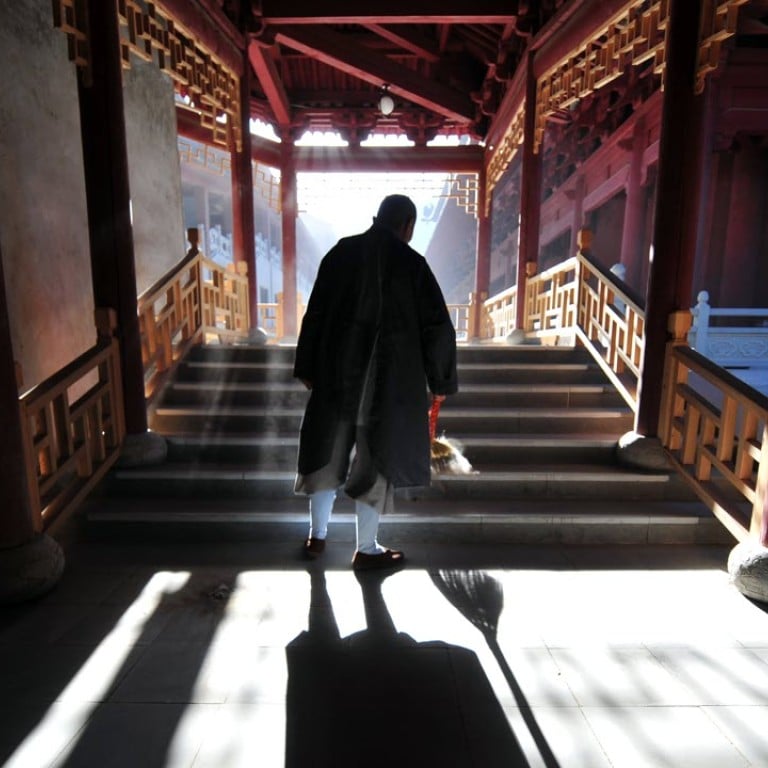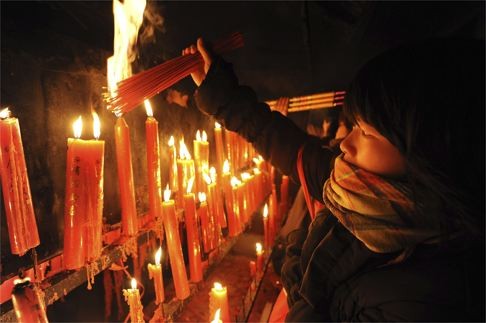
Now and Zen: China’s Buddhist temples open doors to modern mainland soul-searchers
Retreats are proving popular among Chinese seeking solace and meaning in their lives
After a two-month wait, Lin, a university professor in southern China, finally got in.
Lin is not religious but was keen to take a place on a weeklong Buddhist retreat at the Donghua Zen Temple in Guangdong to reflect on her life.
Over those seven days, Lin and more than 30 other women from different parts of the country severed all contact with the outside world and immersed themselves in meditation. They got up at about 4 am and spent the day in contemplation, walking around a Buddhist statue and listening to lectures before calling it a day at 8pm. It proved physically challenging – the long hours of sitting induced severe pain – but Lin left elated.
“I learned a lot from my retreat experience. I know how to correctly meditate and have a deeper understanding of life and the universe,” she said.
“Before the retreat, I was not happy with my job, thinking I wasn’t paid enough and couldn’t find my value at work. But now I have a belief that I live to help other people ... With everything I do, I can benefit other people.”
READ MORE: Following in the footsteps of the master
Lin is just one of many eager people who have signed up for the popular monthly retreats at the temple, which are reserved for women on odd-numbered months and men on the others. Temple staff said demand had grown and it fielded hundreds of applicants for the 40 slots each month.
“People who come to our temple are mostly white-collar workers, business executives, and believers,” a temple volunteer said.
Other temples are also opening their doors to retreaters, with several in different parts of the country saying the applicants are mostly well-educated people with busy work lives.
Retreats can run from a weekend to seven days and most, like Donghua’s, are free. However, some do ask for a contribution.

Yufo Temple in Shanghai hosted its first seven-day retreat for 108 people in October and each attendee had to pay 2,000 yuan (HK$2,400) for the stay. Even so, Wang Hui, who works at the temple, said all the spots were filled within a week of accepting online applications.
Companies are also seeing value in the courses and booking in executives for some quiet time.
“We have hosted executives from big companies like Tencent and Vanke,” an employee at the Dahuaxing Temple in Shenzhen said.
But unlike other temples, Dahuaxing’s retreaters stay at a five-star hotel and eat at a Buddhist vegetarian restaurant at the temple. The two-day stay costs around 3,000 yuan per person.
Analysts say Buddhist retreats offer people a brief respite from busy modern life and reflect the spiritual void many Chinese feel after three decades of rapid economic growth.
READ MORE: Tourists continue search for enlightenment
“As the economy develops, more people can satisfy their material needs but they face new problems with life. Many feel lost when they try to find the meaning and value of life,” said Professor Li Lian, director of the Buddhist Research Centre at Northwest University in Xian.
Li said retreats offered release and comfort for soul-searchers.
Zhang Zong, a researcher on Buddhism from the Chinese Academy of Social Sciences, said retreats were better than inspirational books in that they benefited both body and soul.
“Meditation is done under the instruction of Buddhist masters, who are key to the whole experience,” Zhang said.
READ MORE: Buddhist temple opens to all, is overwhelmed with applicants
Zhang attributed the popularity of Buddhist retreats to China’s history and recent resurgence of Buddhist culture.
“The construction of Buddhist temples and the popularity of Buddhist retreats all reflect the revival of Buddhism in China,” Zhang said.
It’s a far cry from the Cultural Revolution when thousands of temples were demolished and many Buddhists were persecuted.
Li of Northwest University said China was no longer constrained by communist ideology and Buddhism had a promising future in the country.
There are no official figures on the number of Buddhists throughout the country but the Pew Research Centre estimates there were more than 244 million in 2010, half the total worldwide.
While free retreats are applauded, critics say some temples are trying to cash in with high fees.
“It is inevitable that some temples will charge fees for retreats given today’s market economy. But the fees shouldn’t be exorbitantly high and in Buddhism, we don’t hope to sell Zen as a commodity,” Li said.
